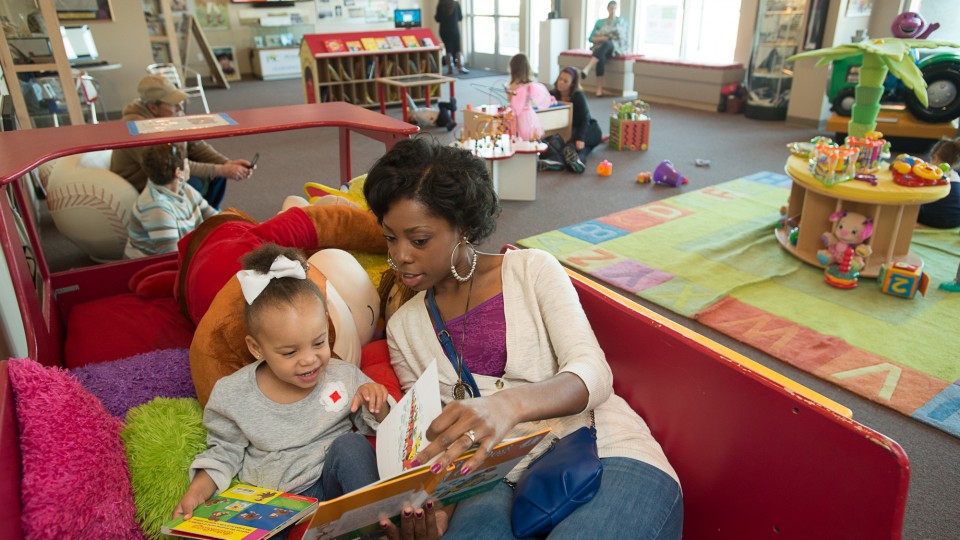Changing the rules for readiness
- March 13, 2016
- / Shannon Nickinson
- / early-learning,report-sci-early-education

Monique Weeks reads with her daughter Lydia Weeks, 2, at the WSRE Imagination Station in Pensacola. Photo credit: Michael Spooneybarger
The rules keep changing for how kindergarten readiness is measured in Florida. Here is an at-a-glance look at changes over the years:
— 1997-1999: Each of Florida’s 67 counties uses Its own system to evaluate preschool programs and measure kindergartners’ readiness. There is no statewide standard for kindergarten readiness assessment.
— 1999-2002: State law creates a screening checklist to test kindergartners on 17 metrics to gauge readiness. It includes the child’s immunizations and other health requirements as necessary, including appropriate vision and hearing screening and examinations, and:
- — The child’s physical development.
- — The child’s compliance with rules, limitations and routines.
- — The child’s ability to perform tasks.
- — The child’s interactions with adults.
- — The child’s interactions with peers.
- — The child’s ability to cope with challenges.
- — The child’s self-help skills.
- — The child’s ability to express his or her needs.
- — The child’s verbal communication skills.
- — The child’s problem-solving skills.
- — The child’s following of verbal directions.
- — The child’s demonstration of curiosity, persistence and exploratory behavior.
- — The child’s interest in books and other printed materials.
- — The child’s paying attention to stories.
- — The child’s participation in art and music activities.
- — The child’s ability to identify colors, geometric shapes, letters of the alphabet, numbers, and spatial and temporal relationships.
— 2003-2006: The state creates the School Readiness Uniform Screening System to “provide objective data regarding” the 17 items. Two assessments are selected through a request for proposal: the Early Screening Inventory – Kindergarten, a developmental screening given to individual students; and one of two observational instruments — either the Work Sampling System or the Ready-for-School Behavioral Screener.
In 2004-2005, the two observational instruments are discontinued and the Dynamic Indicators of Basic Early Literacy Skills (DIBELS) is added.
— 2006-2009: Florida becomes one of the first states in the country to offer free Voluntary Prekindergarten for all 4-year-olds regardless of family income.
The law required school districts to test children for readiness in the first 30 days of school. The Florida Kindergarten Readiness Screener (FLKRS) is designated for this, but FLKRS itself isn’t a test. It is an acronym for whatever testing instrument that’s been designated as the screening test. FLKRS has two parts — a social and developmental piece, Early Childhood Observation System (ECHOS); and the first two measures of DIBELS—letter naming fluency and initial sound fluency, which are used to gauge literacy skills.
— 2010-2014: DIBELS is replaced with Kindergarten Florida Assessment for Instruction in Reading (FAIR-K).
In 2013, the Office of Early Learning merges with the Department of Education, after operating as a separate department in the state education hierarchy.
In 2014, FAIR goes from two parts to six parts: alphabetics, (phonological awareness, letter sounds); oral language (vocabulary pairs and following directions); comprehension (listening comprehension and sentence comprehension).
The test becomes an all-electronic format, but technical glitches, the need for classroom substitutes to cover while the teachers did the evaluation and other issues with the system leads the state to discontinue FAIR.
The Florida Education Department decides that only the Work Sampling System — the observational test that leans heavily toward social, emotional and physical development — would be used to measure readiness.
— 2015: Work Sampling is again used to measure readiness. School districts may choose to use another test to gauge the math, language and literacy skills not covered on Work Sampling.
— 2016: Florida lawmakers instructs the Office of Early Learning not to issue readiness rates for the 2014-2015 and 2015-2016 school years. Questions arose about the validity of the data given the issues with administering the FLKRS.
Source: Florida Office of Early Learning in the Department of Education.
 CivicCon launches with a look at good growth in cities
CivicCon launches with a look at good growth in cities
 Building stronger brains one baby, one parent at a time
Building stronger brains one baby, one parent at a time
 SCI debuts commercial on Early Learning City
SCI debuts commercial on Early Learning City
 Entrecon: World class speakers and an opportunity to sharpen skills
Entrecon: World class speakers and an opportunity to sharpen skills
 PYP Quality of Life survey 2017
PYP Quality of Life survey 2017
 EntreCon Pensacola 2016: A look back
EntreCon Pensacola 2016: A look back
 Leadership tip: getting better employee takeaways
Leadership tip: getting better employee takeaways
 Leadership tip: be interested instead of interesting
Leadership tip: be interested instead of interesting
 Leadership tip: delivering difficult messages
Leadership tip: delivering difficult messages
 Brain Bags boost Arc, Early Childhood Court programs
Brain Bags boost Arc, Early Childhood Court programs